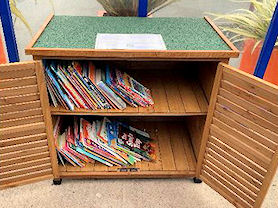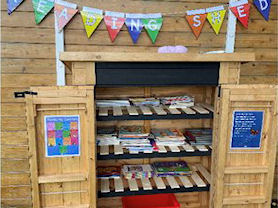English Overview
Phonics
To be taught daily in EYFS, KS1 and in Years 3 and 4 where necessary.
School follows RWI Phonics and children are assessed a key points to ensure that the group they are working in allows then to achieve the best possible results.

Reading
In EYFS and children on the RWI phonics programme
Children have a reading book which is matched to the phonics scheme which they read in school. Children take home a ‘book bag book’ from the RWI phonics scheme which is matched to their phonics stage to read independently. Children also take home a book to share with an adult, along with a Library book from the school library.
Beyond Phonics
Children are benchmarked to assess their stage of reading. Children take home book from their benchmarked stage to read independently. In KS2 children are also enrolled on Reading Plus, an online programme they access for 90 minutes a week in school and can access at home. KS2 children can also access books from the school library.
Spelling
To be taught weekly in KS2 and evidence of the teaching of spelling is in the RWI spelling books.
Children sent home with differentiated words to learn which are tested weekly and marked by an adult to ensure that they are correct.
Reading
Reading will be, in the main, linked to the Colette Higgins units of English but you may wish to use different genre to cover specific objectives and therefore may wish to use different text than the ones suggested by Colette Higgins such as sets of actual Reading Books.
Each class reads to children for 15 minutes each day in school. The class reading book will be a book linked to the unit they are studying through the Colette Higgins units.
There is a ‘book exchange’ at the front of the school, where the school community can share, take home and read and then return to the school.
There are also opportunities for children to read outside on the playground too.
 |
 |
Writing
To be taught weekly and evidence of this in the Writing Book. Writing may be based on the English unit of work from Colette Higgins, or be linked to RE, Science etc. If writing is linked to RE especially, complete the writing in the RE book and put a sticker in the Writing book to signpost where the weeks writing can be found.
GPS/Handwriting
Taught at least once a week. Lessons will show grammar, punctuation and possibly spelling work along with handwriting practise in the handwriting workbooks in KS1 and in English books in KS2. Objectives will be linked to the Colette Higgins units of work.
Individual Reading
All children in KS1 and on the Phonics Programme should be heard read once a week. Records must include the name of the book, the date the child has been heard read and notes about how the child is progressing – this is in addition to completing the child’s reading record which MUST go home and come back to school to show how parents and the school are working together.
In addition, the lowest 20% (approx. 6 children) and Pupil Premium children in KS1 will be heard read at least twice a week to accelerate progress.
In KS2 children complete 90 minutes of individual reading through Reading Plus each week in school.
In addition, the lowest 20% (approx. 6 children) and Pupil Premium children in KS2 will be heard read at least twice a week to accelerate progress.
![]()


